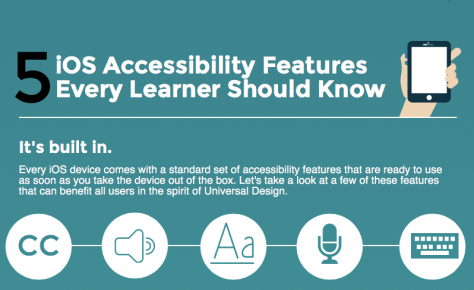It’s built in.
Every iOS device comes with a standard set of accessibility features
that are ready to use as soon as you take the device out of the box.
Let’s take a look at a few of these features that can benefit all users
in the spirit of Universal Design.
Get started by going to Settings > General > Accessibility!
#1: Closed Captions
Closed captions were originally developed for those with hearing
difficulties, but they can help you if you speak English as a second
language or just need them as a support for improved processing.
Captions can also help if your speakers are not working, or the sound in
the video is of poor quality.
80% of caption users did not have any kind of hearing loss in one UK study.
Learn how to enable and customize closed captions on your iOS device.
#2: Speech
All iOS devices support built-in text to speech with the option to
turn on word highlighting. Starting with iOS 8, it is possible to use
the more natural Alex voice formerly available only on the Mac. TTS
supports decoding, which frees you the reader to focus on the meaning of
the text.
Breathe!: Alex takes a breath every once in a while to simulate the way we speak!
- Learn how to enable and use Speak Selection on your iOS device.
- Bonus tip!: Don’t want to make a selection first? No problem. Just bring up Siri and say “Speak Screen.” This will read everything on the screen!
#3: Safari Reader
Safari’s Reader is not really an accessibility feature (you will not
find it in Settings) but it can help you if you find that you get
distracted by all the ads when you are reading or doing research online.
It is also a nice complement to the Speech features mentioned above.
With iOS 9, you can now customize the appearance of the text and even
change the background and font to make it easier to read when you surf
the Web.
Left my heart in…San Francisco is a new system font available in iOS 9. It is designed to be easier to read, and is one of the font options available for Reader.
Learn how to use Safari Reader when you surf the Web.
#4: Dictation
Whenever you see the iOS keyboard, you can tap the microphone icon to
the left of the space bar to start entering text using just your voice.
This can help you get your words down on the page (or is it the
screen?) more efficiently.
Try It!: Dictation can handle complex words. Try this: Supercalifragilisticexpialidocious.
Dictation supports more than just entering text. Follow the link for a helpful list of additional Dictation commands.
#5: QuickType and 3rd Party Keyboards
QuickType is Apple’s name for the word prediction feature now built
into the iOS keyboard. Word prediction can help you if you struggle with
spelling, and it can speed up your text entry as well. Starting with
iOS 8, it is now possible to customize the built-in keyboard by
installing a 3rd party app. The 3rd party keyboards add improved word
prediction, themes for changing the appearance of the keys and more.
17 Seconds: World record for texting. Can you beat it?
Bonus Tips
Struggling to see the screen? – make sure to check out the Vision
section in the Accessibility Settings. You can Zoom in to magnify what
is shown on the screen, Invert Colors to enable a high contrast mode,
make the text larger with Dynamic Text, and much more.
- Learn how to Invert Colors on your iOS device.
- Learn how to use Zoom on your iOS device.
Sources:
- http://www.3playmedia.com/2015/08/28/who-uses-closed-captions-not-just-the-deaf-or-hard-of-hearing/
- http://www.guinnessworldrecords.com/world-records/fastest-time-to-type-a-text-message-(sms)-on-a-touch-screen-mobile-phone/
Article written and graphic created by















No comments:
Post a Comment
Thank you for taking the time to leave a comment and for visiting my blog! Be sure to check daily for my latest posts!